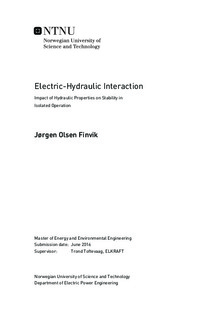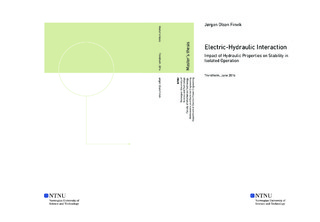Electric-Hydraulic Interaction - Impact of Hydraulic Properties on Stability in Isolated Operation
| dc.contributor.advisor | Toftevaag, Trond | |
| dc.contributor.author | Finvik, Jørgen Olsen | |
| dc.date.accessioned | 2017-03-13T07:49:52Z | |
| dc.date.available | 2017-03-13T07:49:52Z | |
| dc.date.created | 2016-06-14 | |
| dc.date.issued | 2016 | |
| dc.identifier | ntnudaim:15656 | |
| dc.identifier.uri | http://hdl.handle.net/11250/2433748 | |
| dc.description.abstract | The models for hydraulic systems found in standard Power System Analysis tools are often based on simplified mathematical models. These simplifications may lead to inaccurate representations of the dynamic behaviour of hydro power plants. The objective of this Master's thesis was to study hydraulic effects and their impact on the performance of a hydro power plant from an electrical engineering point of view. A model of Riksheim power plant in Sykkylven, Møre og Romsdal has been in implemented in the hydraulic simulation tool LVTrans, in order to ensure that all hydraulic effects are included. The dynamic performance of the power plant in isolated operation was tested and compared to measurements from the real power plant. It was discovered that the hydraulic properties of Riksheim makes it almost impossible to maintain stability in all operating conditions and at the same time satisfy all specifications made by the Transmission System Operator. It is especially the effect of water hammer that has a negative impact on dynamic performance. It was also discovered that careless selection of governor settings may cause resonance between control system and the travelling waves. | |
| dc.language | eng | |
| dc.publisher | NTNU | |
| dc.subject | Energi og miljø, Elektrisk energiomforming | |
| dc.title | Electric-Hydraulic Interaction - Impact of Hydraulic Properties on Stability in Isolated Operation | |
| dc.type | Master thesis |
Tilhørende fil(er)
Denne innførselen finnes i følgende samling(er)
-
Institutt for elkraftteknikk [2412]

